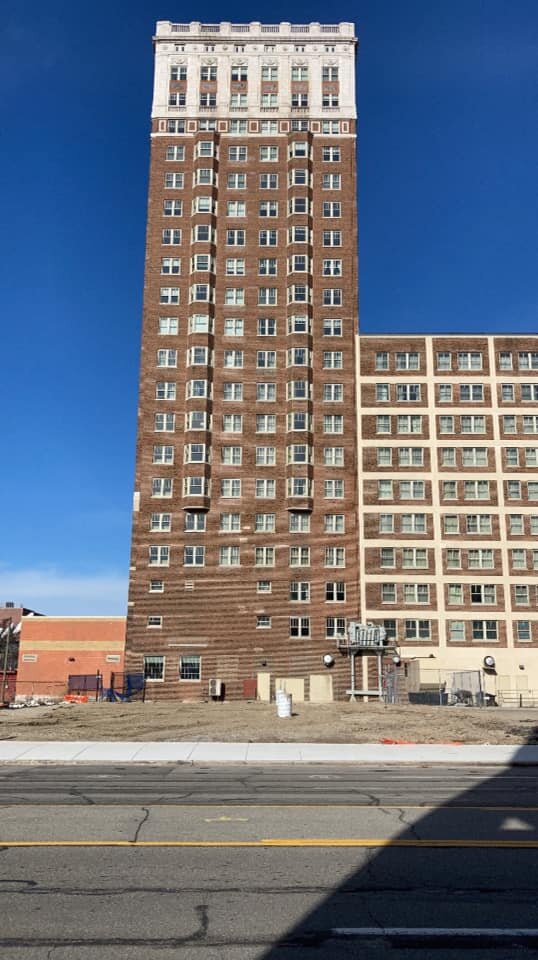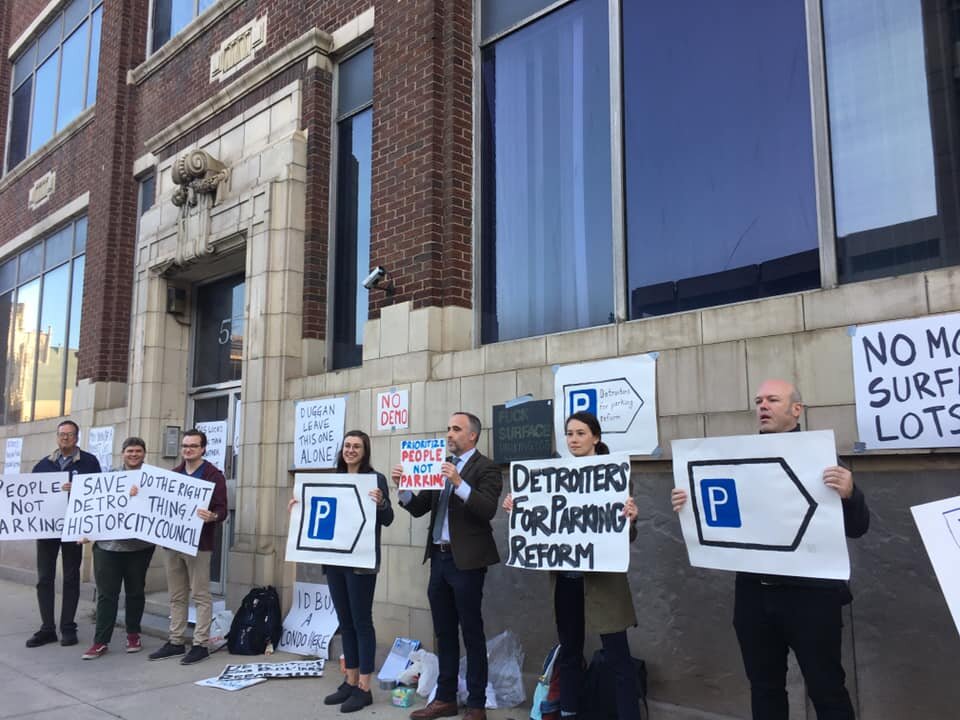Detroiters Push for Parking Reform in the Heart of Motown
Saturday Night building. Fall 2019.
Just over a year ago, Detroit’s City Council voted to allow the demolition of another building in the city’s Central Business District to make way for another surface parking lot. In the long arc of Detroit’s history of parking cars on land previously occupied by buildings, it may not have been an especially noteworthy decision.
Detroit’s urban core is one of the most hollowed out of any major city, with about 40% of the parcels downtown devoted to parking cars. In fact, maybe not surprisingly, the Motor City boasts some of the oldest parking lots in the U.S., at over one hundred years old!
Car kidding aside, Detroit’s decision to allow for the demolition of the historic Saturday Night building that day was another especially galling loss of quality urban fabric that could have easily been converted to productive use.
But losing the Saturday Night was also notable because it highlighted the efforts of a nascent grassroots organization, Detroiters for Parking Reform, of which I am a founding member. The group announced its public coming out just a couple of months earlier, on PARKing Day 2019 when the group laid out a new vision for parking policy in Detroit, articulating a commonsense list of demands for tackling parking in the city.
Site of Saturday Night Building. Fall 2020
Before the COVID-19 pandemic, parking had become a bigger issue in Detroit, as billions of dollars of investment dramatically changed the landscape downtown over the last decade. Led by billionaire mortgage lender Dan Gilbert and others, thousands of office workers and residents have found new homes in renovated commercial buildings and new construction.
And with the opening of Little Caesars Arena in 2017, all four of Detroit’s major league sports teams now play in facilities located within just a few blocks of one another downtown. Not surprisingly, these places also draw crushing waves of suburban automobiles to parking structures and surface lots for short periods of time, only to frustratingly leave them as acres of unused blacktop the rest of the time.
From an urbanist’s standpoint, the forces at work in Downtown Detroit have historically conspired to produce bad outcomes: the over-accommodation of an entrenched car culture, underfunded transit infrastructure, unnecessarily adding costs to developers by mandating parking requirements while at the same time depressing land values, as well as the devastating results of a decades-long loss of urban fabric and vital ground level connective tissue.
However, downtown’s sung a different tune of late. Many of the aforementioned investments have been made with quality-of-life and walkability in mind. From new public spaces and well-designed streetscapes to a renewed retail, restaurant, and storefront scene, there is an undeniable and growing vitality downtown in the last decade missing from how previous generations experienced the city.
Some businesses with the capacity to do so, like Dan Gilbert’s Quicken family of companies, are making strides, and are at the leading-edge of businesses incorporating incentives and requirements for employees at dozens of companies to do things like ride-share, take public transportation, and otherwise reduce parking for employees. In fact, leadership at Quicken understands that reducing parking need will actually benefit the company’s real estate investments in the long run, and allow for more land to be developed with buildings containing more profitable floor area.
But aside from outliers like Quicken, in terms of actually wrangling parking in a holistic way, recent developments downtown have not resulted in inspired policy change. Amid a plethora of new projects, tenants, and residents, there can be a perception of parking scarcity, yet there seems to be little by way of coordination or sharing of parking facilities. New surface parking still eats away at the fringes, even though there is more parking now in Downtown Detroit than at any point in the city’s history. Even when the city as a whole had more than twice the number residents as today, or when downtown’s activity counted as the regional center of finance, business, and commerce.
And while it is unclear exactly what the long-term impacts of the pandemic will be on life in Downtown Detroit, it’s undeniable that the city lacks a comprehensive or strategic approach to parking downtown, or anywhere else for that matter. Detroit should know better by now.
We should all know by now that catering to cars at the expense of urban density and historic buildings is bad for making our city centers attractive or walkable. Not to mention taking land away from other possible beneficial uses, like developments that include affordable housing. It is bad for offering transit options to folks who can’t or don’t want to drive. It has bad public health and environmental consequences, with every additional car exhaust and every additional square foot of black top contributing nothing to a climate solution.
Enter Detroiters for Parking Reform. With the prospect of losing the Saturday Night Building for surface lot, a group of a dozen Detroiters sick and tired of the status quo came together in early 2019 to draft and adopt a Position Paper, which they shared at a press conference on a converted street parking space, replete with tables, chairs, and lawn games, per the PARKing Day tradition, on the third Friday of September, 2019.
Calling for a moratorium on new surface parking downtown, the group’s demand outlines several ways Detroit can do better at parking both downtown and throughout Detroit’s neighborhoods, where conditions are different. Detroiters for Parking Reform seeks to integrate some of the recent initiatives already currently underway, like Quicken’s approach to cutting back on employee parking by calling for a comprehensive study of parking downtown, as well as an adoption of a mobility management service plan, which could coordinate parking between public and private facilities.
And in the spirit of parking guru Donald Shoup’s 750-page tome The High Cost of Free Parking, the group also supports the elimination of parking minimums throughout the city, eliminating parking requirements that have been in place for decades. This demand aligns with recommendations in the City of Detroit’s ongoing ZoneDetroit project currently being led by the City Planning Commission, which seeks to comprehensively streamline Detroit’s Zoning Ordinance, and is slated for adoption by the Detroit City Council sometime in late 2021.
Like most policy change, it’s a long haul, filled with advocacy at various levels, from attending public meetings to make public comment, to working to get meetings with individual City Council members and other city officials, to connecting with business owners and community leaders, to making media appearances and maintaining and growing a social media presence.
And while this strategy was gaining traction in the six months Detroiters for Parking Reform were publicly active in late 2019–early 2020, shifting this strategy during a global pandemic has been challenging. But the group is determined and is making a commitment to advancing its demands, even when the advocacy has to be done virtually.
Tess Parr (center, holding Blue P sign) and other parking reformers in front of the Saturday Night building. Fall 2019
“Right now, there is no politically realistic silver bullet to Detroit’s parking problem,” says Tess Parr, co-founder of Detroiters for Parking Reform. “We’re on defense trying to prevent commercial demolitions and on offense trying to push policies that favor the cyclist, the transit user, and pedestrians.”
On top of all this, engaging city officials and other stakeholders since COVID-19 has been a real challenge. On May 12th of this year, Detroit’s City Council held yet another vote to determine if it would allow yet another short-sighted demolition in the Central Business District to create yet another surface parking lot. After numerous Zoom meetings, and a months-long campaign by Parr’s group, City Council unanimously voted to stop it, citing the amount of public concern it had attracted.
“Honestly, it was a huge win for us,” Parr explains, “For Detroiters for Parking Reform, the goal is to enact policies that eliminate the need for an ad hoc Save This Building! campaign every time this issue comes up.”
Even with the prospect of a long and difficult winter ahead, Detroiters for Parking Reform is looking ahead to recovery, and a time when the human activity of our urban cores can again regain a foothold, and they can work to strategically, and sustainably put cars in their place. They’re not alone. In fact, Detroiters for Parking Reform joins a growing constellation of parking reform initiatives, including the national Parking Reform Network, featured earlier this year.
Parr continues, “We’re really excited about proactively moving this issue forward in 2021, with the support of the Mayor and City Council. We believe they’ll step up to do the right thing. It’s long overdue.”
About the Author
Francis Grunow is an urbanist who believes healthy cities are society's best chance at an equitable and prosperous future. By day he is a public policy consultant working in Detroit. He is also a founding member of Detroiters for Parking Reform. You can connect with Detroiters for Parking Reform on their website and on Facebook.




